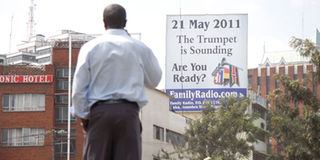Is this how the world will come to an end?

The doomsday billboard next to Globe Cinema round-about in Nairobi. The doomsday message, it has emerged, was dispatched from the FamilyRadio.com headquarters in the US, through their West African offices in Ghana. The church does not have offices in East Africa. Photo/DENNIS OKEYO
Next time you drive into Nairobi, remember to look up ahead as you negotiate the Globe round-about, just before branching into Kirinyaga road.
You will notice a medium-sized billboard atop one of the first buildings that reads: “21 May 2011 The trumpet is sounding Are you ready?” You might wonder what is so special about May 21.
Well, wonder no more. The guys who paid for the billboard want you to believe that you have less than four months to live; that the world will end on Saturday, May 21.
By the end of that day, they argue, if you have been a good boy or girl, you shall be somewhere above the clouds, while the bad boys and girls will be left down here to writhe in pain as the heavens pour down fire and brimstone.
It is not the first time that some self-styled prophet has predicted doomsday, but this could be the first time a billboard to that effect has come up on the streets of Nairobi.
The Saturday Nation tried to track down the doomsayers. It turned out they do not have offices in East Africa. The doomsday message, it emerged, was dispatched from the FamilyRadio.com headquarters in the US, through their West African offices in Ghana.
FamilyRadio.com (not related to Kenya’s Family FM) is linked to Family Stations Inc, led by an American — Mr Harold Camping — who reckons he has finally calculated doomsday.
Mr Harding uses the Bible to support his calculations arguing that the book predicted judgment day to be exactly 7,000 years after another judgment day that happened in 4990BC, commonly referred to as Noah’s floods.
Then, according to the Bible, heavens unleashed a flood that killed everyone except Noah, his wife, and six children. The eight, together with carefully selected animals, were saved by Noah’s carpentry, a mighty ark that defied the killer floods.
According to Mr Harding and his followers, heavens have lined up a similar destruction on May 21, only this time the heavens shall pour fire and brimstone instead of water.
But a large section of the Kenyan church use the same book to fault Mr Harding’s doomsday calculator, arguing that not even the holiest of holies can precisely predict judgment day.
“That is nonsense, are they saying that we should not plan for June?” asks Fr Dominic Wamugunda, a Catholic priest in Nairobi.
The billboards, he says, are yet another example of how commercialised churches have become. The scramble for the Kenyan soul, he says, just climbed a notch higher, as churches pull all tricks to lure in more followers.
But what the priest dismisses as nonsense might easily ignite frantic doomsday preparations in some sections of sub-Saharan Africa, including Kenya, a region where half the Christians believe judgment day is always around the corner.
The latest study by Pew Forum on religion and public life says sub-Saharan countries, including Kenya, are among the most religious in the world. Three in every 10 of them believe in divine revelations sent from heaven.
The study placed Kenya at number 11 in Africa, and 16 in the world in terms of religious fervour.
Five years ago, a similar doomsday gospel led to a mad scramble for caves and underground bunkers in Kinangop, near Naivasha.
Convinced that the world was coming to an end, scores of poor villagers pulled their children out of school, sold off dusty patches of land and burrowed into the earth, ostensibly to escape an impending torrent of fire and brimstone.
Already, the May 21 judgement day rumour is slowly finding its way into online debates in Kenya.
For these reasons, local theologians fear that Mr Harding and his May 21 doomsday gospel might just get more following in the streets of Nairobi than in the streets of New York.
“Remember this is not the first time we are hearing such rumours, some people might easily swallow the it and start selling their property,” says Dr Kabiro Gatimu, a theology lecturer at St Paul’s University, Limuru.
He is not swallowing the May 21 doomsday theory and is confident he shall celebrate his birthday on May 25. But then, Dr Kabiro, with his PhD in theology, has all the protection he needs against convincingly scripted doomsday theories.
Not so thousands of gullible Kenyans who will encounter the doomsday billboard in Nairobi. Mr Camping and his Family Stations Inc quote extensively from the books of Genesis and Peter, generally summarised into what they call a biblical formula of one day being equivalent to 1,000 years to justify his doomsday calculations.
His critics in Nairobi quote from the book of Mathew to counter the doomsday gospel, arguing even Jesus Christ himself, who is supposed to preside over judgment day, cannot calculate the exact day.
Beneath the May 21 doomsday billboard, heavy machinery rumbles on, constructing Kenya’s largest highway, expected to be ready by the end of this year. If indeed the end shall be on May 21, you and I will never get to enjoy this futuristic highway.




